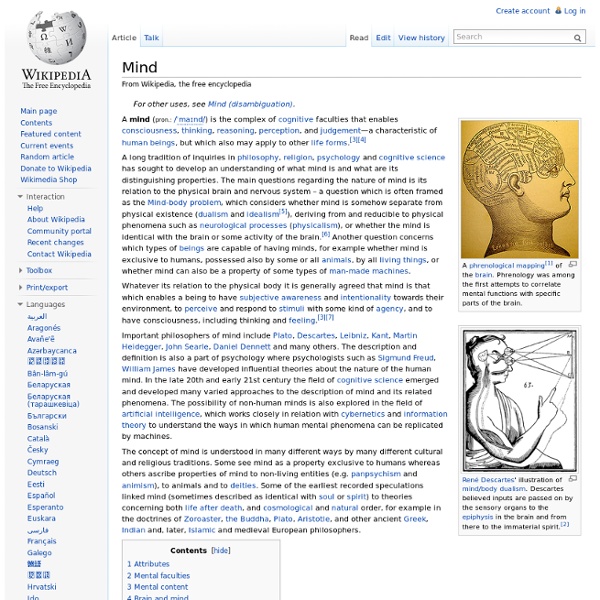Personality
Personality has to do with individual differences among people in behaviour patterns, cognition and emotion.[1] Different personality theorists present their own definitions of the word based on their theoretical positions.[2] The term "personality trait" refers to enduring personal characteristics that are revealed in a particular pattern of behaviour in a variety of situations. Individual differences in personality have many real life consequences.[3][4] Measuring[edit]
The Ten Most Revealing Psych Experiments
Psychology is the study of the human mind and mental processes in relation to human behaviors - human nature. Due to its subject matter, psychology is not considered a 'hard' science, even though psychologists do experiment and publish their findings in respected journals. Some of the experiments psychologists have conducted over the years reveal things about the way we humans think and behave that we might not want to embrace, but which can at least help keep us humble.
New York State of Mind - Wikipedia
In 2004, it was announced that Joel had agreed to write two children's books for Scholastic, the U.S. publisher. The first book was entitled Goodnight, My Angel (A Lullabye). The second book was entitled New York State of Mind and is illustrated by the artist Izak. The large picture book comes with a CD of the song, the disc is illustrated with a picture of the Empire State Building by Izak.
Clause
Two major distinctions[edit] A primary division for the discussion of clauses is the distinction between main clauses (i.e. matrix clauses, independent clauses) and subordinate clauses (i.e. embedded clauses, dependent clauses).[3] A main clause can stand alone, i.e. it can constitute a complete sentence by itself. A subordinate clause (i.e. embedded clause), in contrast, is reliant on the appearance of a main clause; it depends on the main clause and is therefore a dependent clause, whereas the main clause is an independent clause. A second major distinction concerns the difference between finite and non-finite clauses. A finite clause contains a structurally central finite verb, whereas the structurally central word of a non-finite clause is often a non-finite verb. Traditional grammar focuses on finite clauses, the awareness of non-finite clauses having arisen much later in connection with the modern study of syntax.
The Top 10 Psychology Studies of 2010
The end of 2010 fast approaches, and I'm thrilled to have been asked by the editors of Psychology Today to write about the Top 10 psychology studies of the year. I've focused on studies that I personally feel stand out, not only as examples of great science, but even more importantly, as examples of how the science of psychology can improve our lives. Each study has a clear "take home" message, offering the reader an insight or a simple strategy they can use to reach their goals , strengthen their relationships, make better decisions, or become happier.
Anti-Love Potion No. XXX
"Young Japanese men are growing indifferent or even averse to sex , while married couples are starting to have it even less," reports The Japan Times , citing a 2010 poll. The trend is escalating rapidly. More than 36% of men aged 16 to 19 have no interest in sex, more than double the 17.5 % from 2008. Men between 20 and 24 showed a similar trend, jumping from 11.8 % to 21.5 %, while men between 45 and 49 leaped from 8.7 % to 22.1 %. Japan isn't alone. In France, a 2008 survey found that 20 percent of younger French men had no interest in sex.
State of mind Synonyms, State of mind Antonyms
Relevance Relevance ranks synonyms and suggests the best matches based on how closely a synonym’s sense matches the sense you selected. Complexity Complexity sorts synonyms based on their difficulty.
Subject
Subject (Latin: subiectus "lying beneath") may refer to: Philosophy[edit] Linguistics[edit] Music[edit]
Top 10 Thinking Traps Exposed
Our minds set up many traps for us. Unless we’re aware of them, these traps can seriously hinder our ability to think rationally, leading us to bad reasoning and making stupid decisions. Features of our minds that are meant to help us may, eventually, get us into trouble. Here are the first 5 of the most harmful of these traps and how to avoid each one of them. 1. The Anchoring Trap: Over-Relying on First Thoughts
"Oppositional Defiant Disorder" or "Just Behaving Like a Boy"?
Last week, as I was pondering how to begin this blog, I received a call from a worried mother of a five-year-old boy. Her son, Jonathon (not his real name), was about to be thrown out of kindergarten. He constantly argued with his teacher and refused to comply with the simplest of requests--such as lining up to go back to the classroom after recess. Jonathon insisted on bringing his toys to school, even though it was against the rules, and had a fall-down-on-the-floor tantrum if his teacher tried to separate him from his toy.



